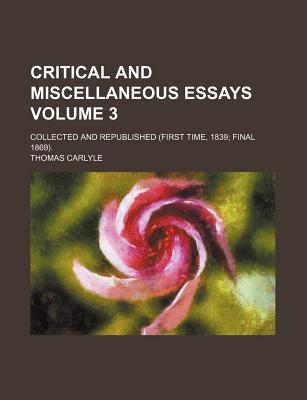Critical and Miscellaneous Essays; Collected and Republished (First Time, 1839 Final 1869). Volume 3
by Thomas Carlyle
Purchase of this book includes free trial access to www.million-books.comwww.million-books.com where you can read more than a million books for free. This is an OCR edition with typos. Excerpt from book: SCHILLER.1 [1831.] To the student of German Literature, or of Literature in general, these Volumes, purporting to lay open the private intercourse of two men eminent beyond all others of their time in that department, will doubtless be a welcome appearance. Neither Schiller nor Goethe has ever, that we have hitherto seen, written worthlessly on any subject; and the writings here offered us are confidential Letters, relating moreover to a highly important period in the spiritual history, not only of the parties themselves, but of their country likewise; full of topics, high and low, on which far meaner talents than theirs might prove interesting. We have heard and known so much of both these venerated persons; of their friendship, and true cooperation in so many noble endeavours, the fruit of which has long been plain to every one: and now are we to look into the secret constitution and conditions of all this; to trace the public result, which is Ideal, down to its roots in the Common; how Poets may live and work poetically among the Prose things of this world, and Fausts and Tells be writtenon rag-paper and with goose-quills, like mere. Minerva Novels, and songs by a Person of Quality! Virtuosos have glass bee-hives, which they curiously peep into; but here truly were a far stranger sort of honey-making. Nay, apart from virtuosoship, or any technical object, what a hold have such things on our universal curiosity as men ! If the sympathy we feel with one another is infinite, or nearly so, ?in proof of which, do but consider the boundless ocean of Gossip (imperfect, undistilled Biography) which is emitted and imbibed by the human species daily;?if every secret- history, every closed-doors conversation, how trivial soever, has an interest for us; then might the conversation of...
BUY NOW
Paperback, 230 pages
Published July 10th 2012 by Rarebooksclub.com (first published July 1st 2003)
© 2025 Bibleportal.com 版权所有.

Thomas Carlyle was a Scottish satirical writer, essayist, historian and teacher during the Victorian era. He called economics "the dismal science", wrote articles for the Edinburgh Encyclopedia, and became a controversial social commentator.
Coming from a strict Calvinist family, Carlyle was expected by his parents to become a preacher, but while at the University of Edinburgh, he lost his Christian faith. Calvinist values, however, remained with him throughout his life. This combination of a religious temperament with loss of faith in traditional Christianity made Carlyle's work appealing to many Victorians who were grappling with scientific and political changes that threatened the traditional social order.
... Show more